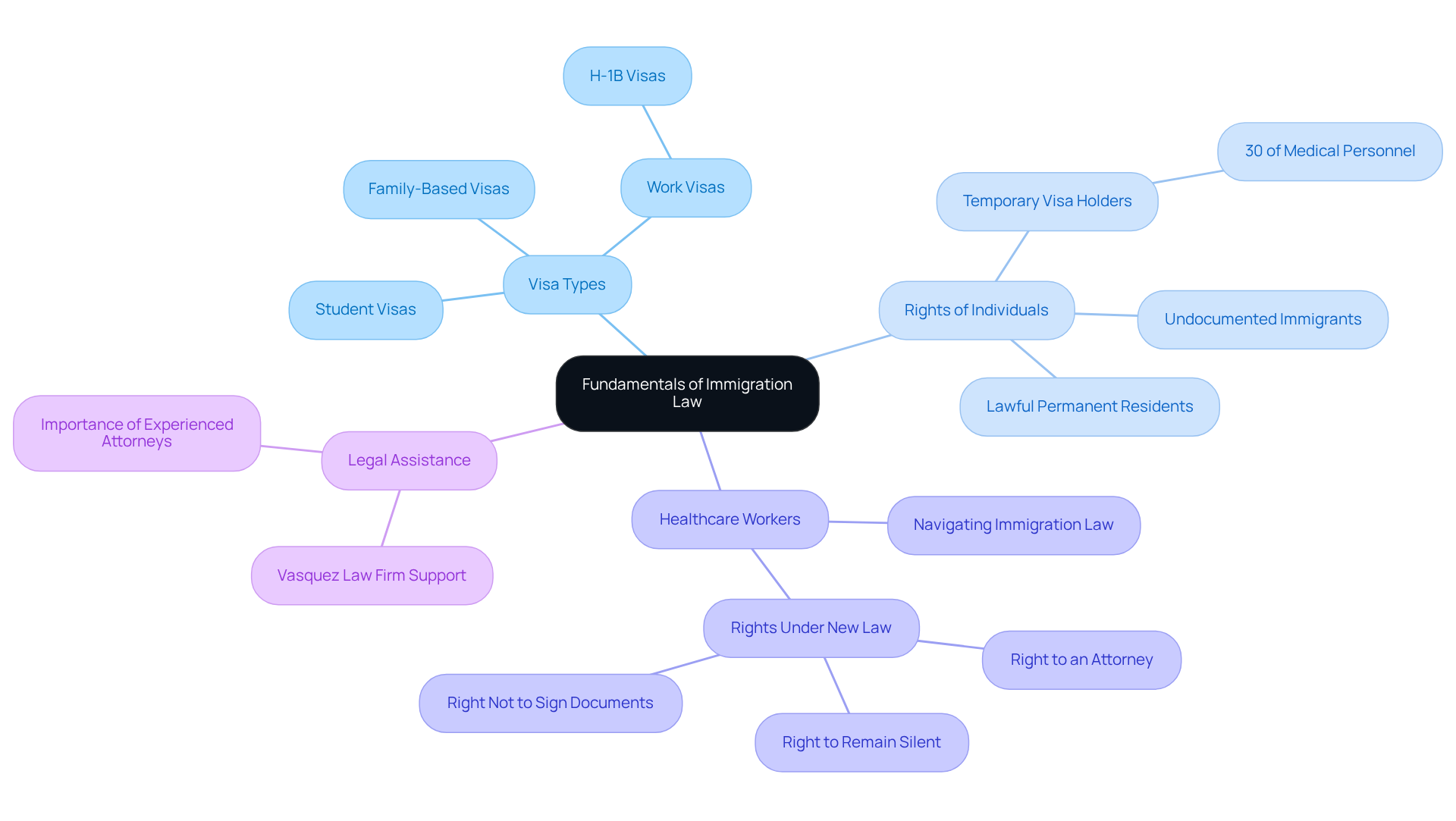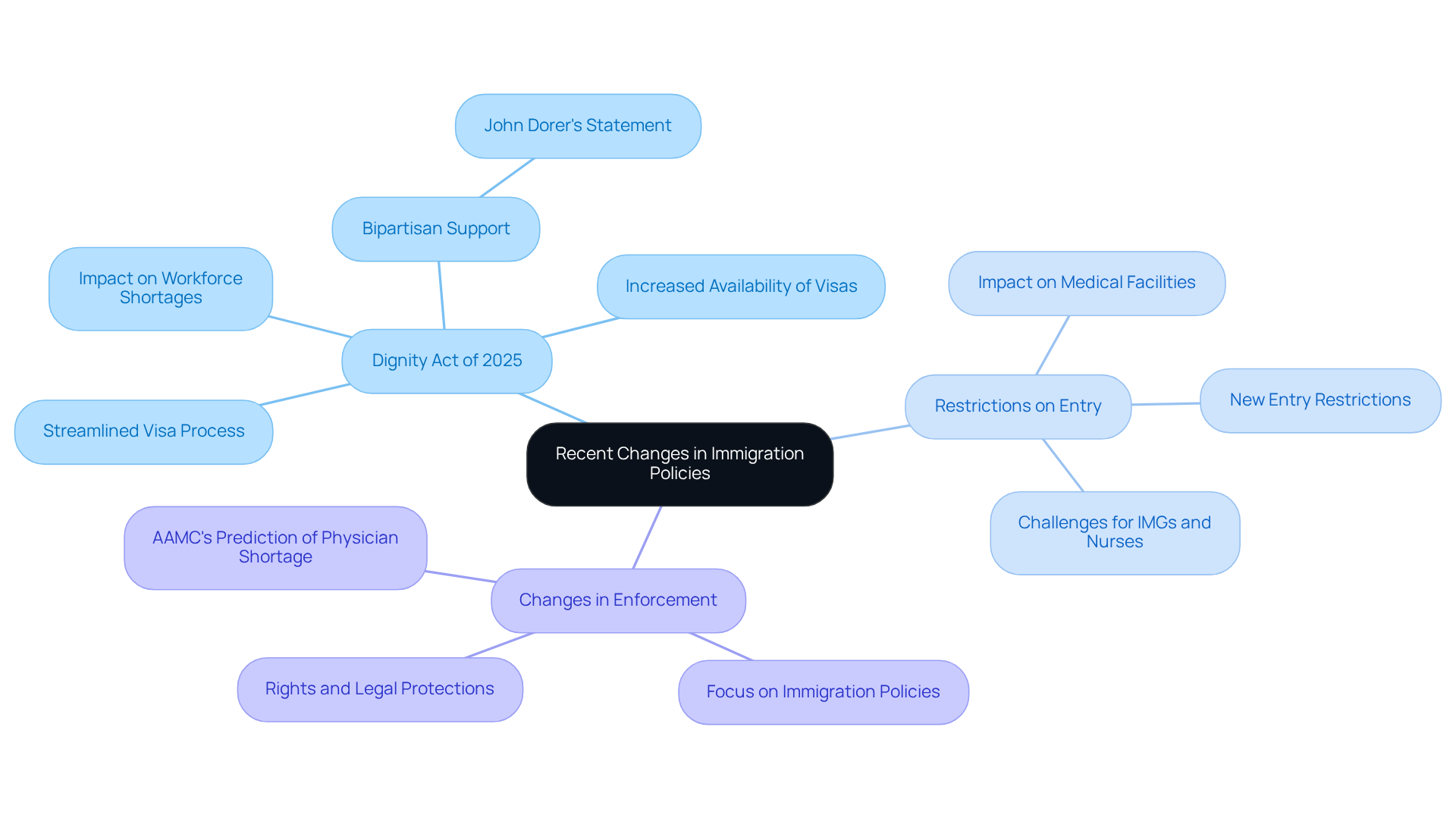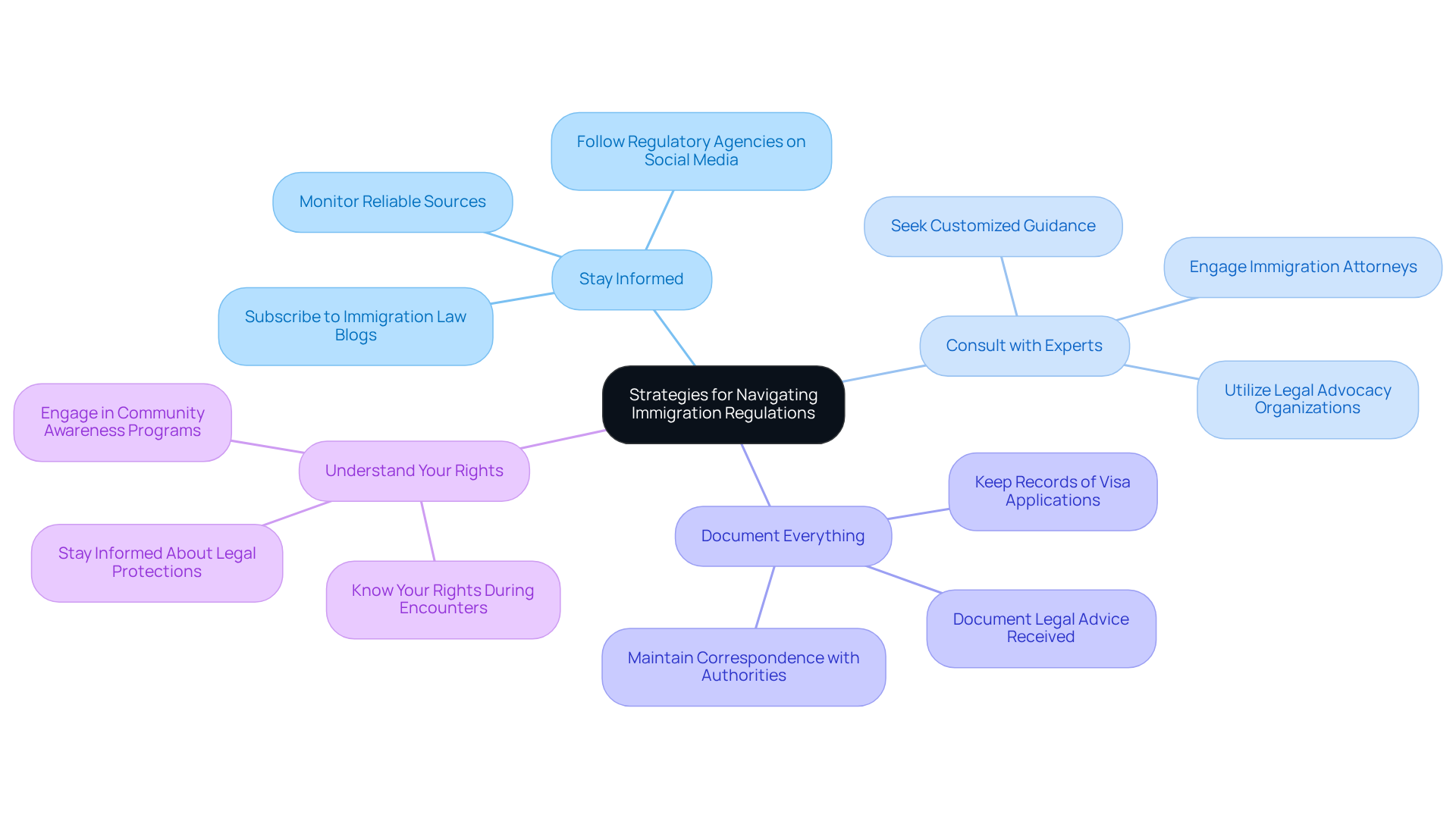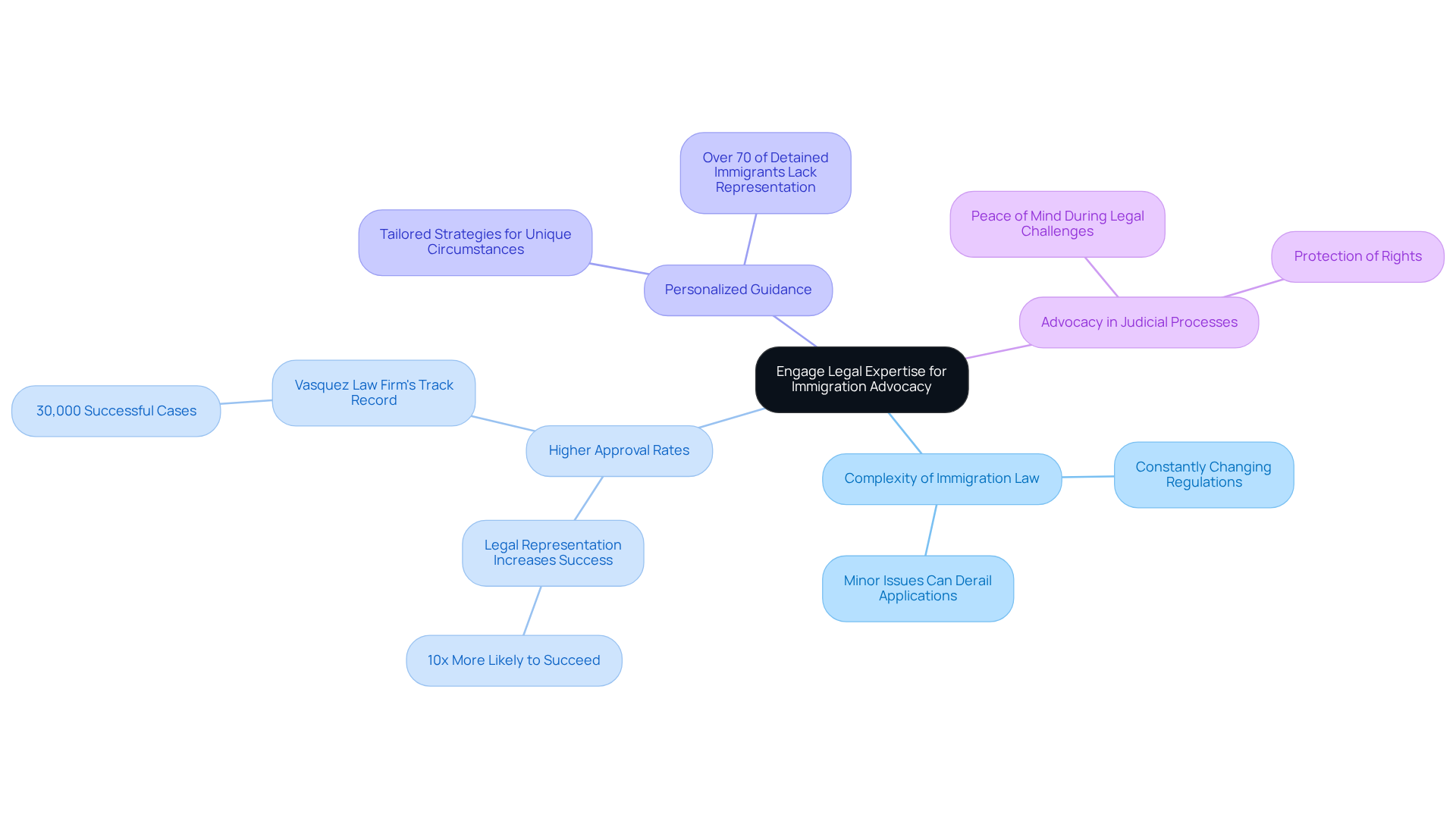Overview
Healthcare workers face the daunting challenge of navigating the new immigration law, grappling with various visa types, their rights, and the implications of recent policy changes. Have you ever felt overwhelmed by the complexities of immigration processes? Staying informed and seeking legal assistance are crucial steps that can empower healthcare professionals to manage their residency status effectively.
Remember, you are not alone in this fight. It’s essential to understand your rights, especially as regulations continue to evolve. We’re here to fight for you and ensure that you can advocate for your rights amidst these changes.
Introduction
Navigating the complexities of immigration law can feel overwhelming, particularly for healthcare workers who are essential to the U.S. medical system. Recent changes in immigration policies mean that understanding these new regulations is not just helpful—it’s crucial for ensuring compliance and protecting your rights.
As the landscape evolves, how can healthcare professionals adapt to these new rules while advocating for themselves and their patients? This article explores the vital steps healthcare workers must take to navigate the intricacies of the new immigration law, empowering them to thrive in their careers amidst shifting regulations.
Explore the Fundamentals of Immigration Law
The new immigration law in the United States presents a complex framework that dictates how individuals can enter, reside, and work within the country. Understanding its key components is crucial for healthcare workers navigating this landscape.
Have you ever felt lost in the immigration process? Familiarity with various visa types, including work visas, family-based visas, and student visas, is vital. Each category comes with distinct eligibility criteria and application procedures. For example, medical professionals frequently use H-1B visas, designed specifically for skilled individuals in specialized areas, including nursing and medical personnel.
It’s important to know you have rights, even if others tell you otherwise. Distinguishing between lawful permanent residents, temporary visa holders, and undocumented immigrants is essential for medical personnel to recognize their rights and available options. Roughly 30% of medical personnel in the U.S. possess temporary employment visas, emphasizing the significance of comprehending their particular status.
It is imperative for healthcare workers to be informed about their rights under the new immigration law in the U.S. This includes safeguards against discrimination and the right to seek assistance when confronting immigration-related issues. In pressing circumstances—like receiving a subpoena, encountering ICE enforcement actions, or managing deportation/removal proceedings—understanding your rights is crucial: you have the right to remain silent, the right to an attorney, and the right not to sign documents without counsel. Immediate action is required in these scenarios. If you face such crises, reach out to Vasquez Law Firm for immediate assistance. Our team is available 24/7 to offer support and guidance.
By mastering these fundamental aspects of immigration law and knowing how to respond in emergencies, professionals can effectively navigate their journeys and advocate for their rights. We’re in the fight with you, ensuring you remain informed and empowered in your work environments. Vasquez Law Firm is dedicated to community involvement, providing extensive legal services in visa matters and personal injury law, ensuring that individuals obtain the representation they deserve.

Analyze Recent Changes in Immigration Policies
In 2025, significant changes to immigration policies have reshaped the landscape for healthcare workers, necessitating a thorough understanding of the new regulations.
-
Dignity Act of 2025: This pivotal legislation aims to streamline the visa process for healthcare professionals, potentially increasing the availability of visas for nurses and doctors. John Dorer, CEO of EB-3 Staffing Solutions for Employers, emphasizes, 'A bipartisan proposal could bring needed relief for immigrant employees and physicians.' This statement underscores the urgency of these changes in addressing workforce shortages.
-
Restrictions on Entry: Recent proclamations have introduced new restrictions on entry for certain nonimmigrant workers, directly affecting medical facilities' ability to attract international talent. This change highlights the need for strategic planning among medical organizations that depend on a diverse workforce due to the new immigration law. As noted, "International medical graduates (IMGs), nurses, and caregivers face long waits for green cards and limited visa options," emphasizing the challenges in recruitment.
-
Changes in Enforcement: The enforcement landscape has evolved, focusing on immigration policies within medical settings. Healthcare workers must be aware of their rights and the legal protections available to them, ensuring they can navigate these changes without jeopardizing their employment or status. The Association of American Medical Colleges (AAMC) anticipates a deficit of 86,000 doctors by 2036, making it essential for medical professionals to remain vigilant about their rights and the consequences of these policies.
Staying informed about these developments is crucial for medical professionals to effectively manage their residency status and comply with the latest regulations. Understanding the implications of these policies will empower them to advocate for their rights and secure their positions in an increasingly competitive environment.

Implement Strategies for Navigating New Immigration Regulations
To effectively navigate the evolving landscape of immigration regulations, healthcare workers should adopt the following strategies:
- Stay Informed: Regularly monitor reliable sources for updates on immigration policies, including the USCIS website and legal advocacy organizations. Staying current is essential, as the new immigration law can frequently change, affecting visa eligibility and application processes. Have you ever felt lost in the immigration process?
- Consult with Experts: Engage with attorneys who specialize in medical visas, such as those at Vasquez Law Firm. Their expertise can offer customized guidance and representation, ensuring that medical professionals comprehend the nuances of their specific situations, including deportation defense and other essential services. Remember, you don’t have to face this alone—we’re here to guide you.
- Document Everything: Maintain comprehensive records of all documents related to residency status, including visa applications, correspondence with authorities, and any legal advice received. This documentation can be invaluable in case of disputes or inquiries. It’s important to know you have rights, even if others tell you otherwise.
- Understand Your Rights: Get to know your rights as a medical professional, especially during encounters with enforcement agencies. Understanding these rights can help mitigate risks and ensure compliance with regulations.
By applying these strategies, medical professionals can effectively handle their residency status and reduce the likelihood of issues, thus improving their capacity to assist their communities. Furthermore, with the recent modifications to Temporary Protected Status (TPS) for different nations under the new immigration law, it is crucial for medical professionals to remain updated on how these changes may influence their residency status. Vasquez Law Firm is dedicated to providing accessible representation, offering no upfront costs and flexible payment plans to ensure that all clients can pursue the justice they deserve. We’re here to fight for your family—your future matters to us.

Engage Legal Expertise for Effective Immigration Advocacy
Navigating immigration issues can feel overwhelming for medical professionals. It’s essential to leverage professional knowledge to tackle these complexities. Here’s why seeking legal counsel from a trusted firm like Vasquez Law Firm—boasting over 30 years of experience and an impressive 98% success rate—can make a significant difference:
-
Complexity of Immigration Law: Immigration law is not only intricate but also constantly changing. Recent shifts resulting from the new immigration law have led to increased scrutiny and longer processing times. An experienced attorney from Vasquez Law Firm can help you understand these nuances and ensure compliance with current regulations. Even minor issues can derail applications, such as a healthcare worker facing delays due to missing documentation. An attorney can identify and resolve these issues before submission.
-
Higher Approval Rates: Studies indicate that individuals with legal representation are ten times more likely to succeed in their cases compared to those without. This statistic underscores the substantial impact that legal advice can have on visa approval rates. As attorney Mario Godoy states, "Your choice to hire a knowledgeable visa lawyer can save you time, money, and stress—and make the difference between your naturalization application being denied or approved." With Vasquez Law Firm's proven track record of over 30,000 successful cases, you can trust in their expertise.
-
Personalized Guidance: A legal professional offers tailored counsel based on your unique circumstances, empowering medical professionals to navigate their specific situations effectively. This personalized approach is crucial, especially considering that over 70% of detained immigrants face courts without representation, often leading to negative outcomes. For instance, a nurse seeking a work visa may benefit from targeted strategies that an attorney from Vasquez Law Firm can provide, ensuring a smoother application process.
-
Advocacy in Judicial Processes: If you encounter judicial challenges, having a lawyer ensures that your rights are protected and that you receive fair treatment. Legal representation not only enhances the chances of a favorable outcome but also provides peace of mind during a stressful process. As Aarti Kohli, executive director of the Asian Law Caucus, emphasizes, "The Constitution has always been clear—if you are born here, you’re a citizen," highlighting the importance of understanding your rights in the residency process.
By utilizing the legal expertise of Vasquez Law Firm, including their bilingual services and free initial consultations, healthcare workers can navigate the immigration process more effectively. This not only improves their chances of success but also secures their rights in an increasingly complex legal landscape. Remember, we’re here to fight for your family—Yo Peleo — We Fight.

Conclusion
Navigating the new immigration law is crucial for healthcare workers determined to secure their positions and rights within the United States. This article sheds light on the complexities of immigration policies and the importance of understanding various visa types, legal rights, and recent changes that directly impact medical professionals. By staying informed and proactive, healthcare workers can effectively advocate for themselves and their communities.
Key points discussed include:
- The significance of familiarizing oneself with different visa categories.
- The rights afforded to healthcare workers under the new law.
- The necessity of seeking legal expertise to navigate this evolving landscape.
The Dignity Act of 2025 and recent enforcement changes underscore the critical need for healthcare professionals to be aware of their rights and the implications of policy shifts. Implementing strategies such as staying informed, consulting with legal experts, and documenting all relevant information can empower individuals to manage their residency status successfully.
Ultimately, the message is clear: staying informed and seeking legal guidance are vital steps for healthcare workers confronting the challenges of the new immigration law. By understanding their rights and the resources available, medical professionals can navigate these complexities with confidence, ensuring they contribute to the healthcare system while securing their futures. Engaging with legal experts, like those at Vasquez Law Firm, can provide the necessary support to advocate effectively and protect one’s rights in this intricate legal landscape.
Frequently Asked Questions
What is the purpose of the new immigration law in the United States?
The new immigration law establishes a framework that dictates how individuals can enter, reside, and work in the U.S., which is particularly important for healthcare workers.
Why is it important for healthcare workers to understand different visa types?
Understanding various visa types, such as work visas, family-based visas, and student visas, is crucial as each category has specific eligibility criteria and application procedures that healthcare workers must navigate.
What is the H-1B visa and who commonly uses it?
The H-1B visa is designed for skilled individuals in specialized areas, including medical professionals and nurses, and is commonly used by healthcare workers.
What rights do healthcare workers have under the new immigration law?
Healthcare workers have rights that include protections against discrimination and the right to seek assistance with immigration-related issues. They also have specific rights in emergencies, such as the right to remain silent, the right to an attorney, and the right not to sign documents without legal counsel.
What should healthcare workers do if they face urgent immigration-related issues?
In urgent situations, such as receiving a subpoena or encountering ICE enforcement actions, healthcare workers should seek immediate assistance from legal professionals, like the Vasquez Law Firm, which is available 24/7.
How does the Vasquez Law Firm support healthcare workers?
The Vasquez Law Firm provides extensive legal services in visa matters and personal injury law, helping individuals obtain the representation they need and ensuring they are informed and empowered in their work environments.




